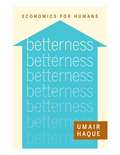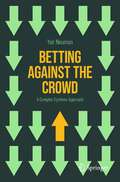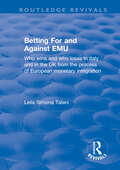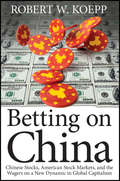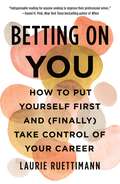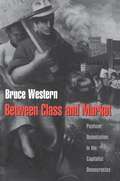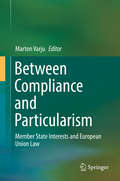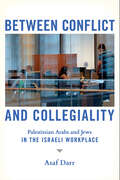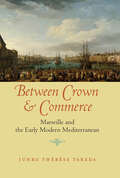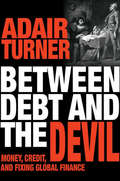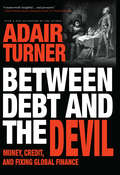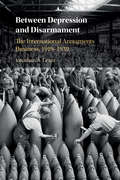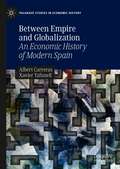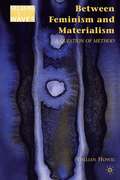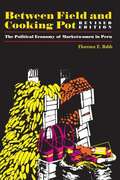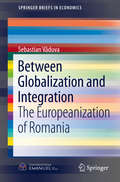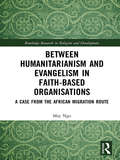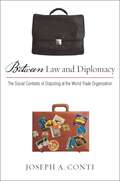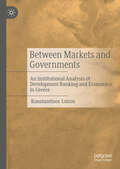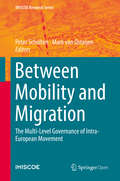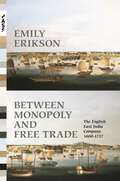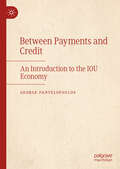- Table View
- List View
Betterness
by Umair HaqueBetterness: Economics for Humans is a powerful call to arms for a post-capitalist economy. Umair Haque argues that just as positive psychology revolutionized our understanding of mental health by recasting the field as more than just treating mental illness, we need to rethink our economic paradigm. Why? Because business as we know it has reached a state of diminishing returns-though we work harder and harder, we never seem to get anywhere. This has led to a diminishing of the common wealth: wage stagnation, widening economic inequality, the depletion of the natural world, and more. To get out of this trap, we need to rethink the future of human exchange. In short, we need to get out of business and into betterness.HBR Singles provide brief yet potent business ideas, in digital form, for today's thinking professional.
Betting Against the Crowd: A Complex Systems Approach
by Yair NeumanCrowds are misleading, both in their simplicity and in their complexity. On the one hand, they behave according to expected trends; on the other, they present sudden shifts and frantic, unexpected behavior. Therefore, “betting against the crowd,” whether in politics, sports, or finance, requires a deep understanding of the crowd’s dynamics. In this book, Prof. Neuman addresses this challenge by delving into the complexity of crowds. The book involves foundational issues and novel ideas, such as why crowds behave unexpectedly, why betting against the crowd is possible only in short time frames, why is it important to be attentive to suspicious signs that are indicative of the crowd’s behavior, and why the long tail of fatalities in armed conflicts leaves us surprised by blitz attacks of violent mobs. The book combines scientific knowledge, experiments, and accessible, often humorous, exposition. It can be read by anyone with a basic science education who seeks to understand crowds and how one can act within and against them.
Betting for and Against EMU: Who Wins and Loses in Italy and in the UK from the Process of European Monetary Integration (Routledge Revivals)
by Leila TalaniThis title was first published in 2000: An analysis of the extent to which the outcomes of the process of European monetary integration and, particularly, of the development of the debate over the establishment of EMU, have been influenced by domestic politics and by domestic economic interest groups in Italy and in the United Kingdom. From an empirical point of view, the work provides an account of the development of Italian and British socio-economic interest groups towards the issue of European monetary union from the making of the EMS until the establishment of EMU.
Betting on China: Chinese Stocks, American Stock Markets, and the Wagers on a New Dynamic in Global Capitalism
by Robert W. KoeppThe promise and perils of Chinese stocks in American stock markets Betting on China takes readers on an illuminating journey into the often confusing and poorly understood world of Chinese stock issuances in America. With insightful qualitative and quantitative analysis, it looks at the phenomenon of equity and capital exchanged between the world's two largest economies and the implications for global finance. Written in an accessible narrative style and amply supported by hard data, the book examines the context and underpinnings of the Sino-American equity relationship, revealing its core dynamics through real-world case studies that range from the precedent-setting blockbuster IPO of China Mobile to the near breakdown of the U.S.-China equity exchange mechanism brought about by short seller attacks on Chinese concept stocks. Combining an insider's eye with an outsider's objectivity, American born author and Beijing-based consultant Robert Koepp explores the reasons and the means by which China, America, and the global economy reap enormous gains from the process of Chinese companies issuing equity shares on U.S. stock markets. Betting on China exposes the complexities and nuances of a vital but underappreciated pillar of modern international finance and offers a window into China's role as a dominant but still modernizing economic superpower. Analyzes on a macro- and microscale the forces that move Chinese companies to raise capital on NASDAQ and the New York Stock Exchange and what this means for the world at large Explores the real stories behind why and how China-based enterprises develop as public companies listed in the United States—and why government regulations need to work in support of and not against this force of market nature Shows that the "betting" on China that occurs through the U.S. equity market exchanges is critical for getting an accurate picture of China's position and prospects in our interactively connected global economy Detailed but accessible, Betting on China is essential reading for global finance professionals, policymakers and regulators, students of finance, people doing business in China, and anyone curious about China's place in—and impact on—the global economy today and in the years to come.
Betting on You: How to Put Yourself First and (Finally) Take Control of Your Career
by Laurie Ruettimann"Indispensable reading for anyone seeking to improve their professional selves."—Daniel H. Pink, #1 New York Times bestselling author of WhenAn essential guide for how to snap out of autopilot and become your own best advocate, with candid anecdotes and easy-to-adopt steps, from veteran HR specialist and popular podcast host Laurie Ruettimann Chances are you've spent the past few months cooped up inside, buried under a relentless news cycle and work that never seems to switch off. Millions of us worldwide are overworked, exhausted, and trying our hardest—yet not getting the recognition we deserve. It’s time for a fix.Top career coach and HR consultant Laurie Ruettimann knows firsthand that work can get a hell of a lot better. A decade ago, Ruettimann was uninspired, blaming others and herself for the unhappiness she felt. Until she had an epiphany: if she wanted a fulfilling existence, she couldn’t sit around and wait for change. She had to be her own leader. She had to truly take ahold of life—the good, the bad, and the downright ugly—in order to transform her future. Today, as businesses prioritize their bottom line over employee satisfaction and workers become increasingly isolated, the need to safeguard your well-being is crucial. And though this sounds intimidating, it’s easier to do than you think. Through tactical advice on how to approach work in a smart and healthy manner, which includes knowing when to sign off for the day, doubling down on our capacity to learn, fixing those finances, and beating impostor syndrome once and for all, Ruettimann lays out the framework necessary to champion your interests and create a life you actually enjoy.Packed with advice and stories of others who regained control of their lives, Betting on You is a game-changing must-read for how to radically improve your day-to-day, working more effectively and enthusiastically starting now.
Betting on the Future: The Virtues of Contingent Contracts
by Max H. Bazerman James J. GillespieIt happens all the time. Two parties with common interests fail to reach an agreement--about a sale, a merger, a technology transfer--because they have different expectations about the future. They are both so confident in their prediction, or so suspicious of the other side's motives, that they refuse to compromise. Such impasses are hard to break through. Fortunately, they can often be avoided altogether by using a straightforward but frequently overlooked type of agreement called a contingent contract. The terms of a contingent contract are not finalized until the uncertain event in question--the contingency--takes place. In some areas of business, such as compensation, contingent contracts are common: a CEO's pay is tied to the company's stock price, for instance. But in many business negotiations, contingent contracts are either ignored or rejected out of hand. That's a mistake, according to the authors. In an increasingly uncertain world, flexible contingent contracts can actually be more rational and less risky than rigid, traditional ones. In particular, contingent contracts offer six benefits: they enable a difference of opinion to become the basis of an agreement, not an obstacle to it; they cancel out the biases of negotiators; they level the playing field by reducing the impact of asymmetric information; they provide a means of uncovering deceitful dealings; they reduce risk by sharing it among parties; and they motivate parties to fulfill their promises. While contingent contracts are not appropriate in all instances, they are much more broadly applicable than managers may think.
Between Class and Market: Postwar Unionization in the Capitalist Democracies
by Bruce WesternIn the United States, less than one worker in five is currently in a labor union, while in Sweden, virtually the entire workforce is unionized. Despite compelling evidence for their positive effects, even the strongest European unions are now in retreat as some policymakers herald the U.S. model of market deregulation. These differences in union power significantly affect workers' living standards and the fortunes of national economies. What explains the enormous variation in unionization and why has the last decade been so hostile to organized labor? Bruce Western tackles these questions in an analysis of labor union organization in eighteen capitalist democracies from 1950 to 1990. Combining insights from sociology and economics in a novel way, Western views unions as the joint product of market forces and political and economic institutions. The author argues that three institutional conditions are essential for union growth: strong working-class political parties, centralized collective bargaining, and union-run unemployment insurance. These conditions shaped the impact of market currents and explain variations across industries, across countries, and over time for the four decades since 1950. Between Class and Market traces the story of the postwar labor movements supported by a blend of historical investigation and sophisticated statistical analysis in an innovative framework for comparative research. Western tightly integrates institutional explanation and comparative method in a way that balances comparative generality with the unique historical experiences of specific cases.
Between Compliance and Particularism: Member State Interests and European Union Law
by Marton VarjuThe book examines how the interests of the member states, which provide the primary driving force for developments in European integration, are internalised and addressed by the law of the European Union. In this context, member state interests are taken to mean the policy considerations, economic calculations, local socio-cultural factors, and the raw expressions of political will which shape EU policies and determine member state responses to the obligations arising from those policies. The book primarily explores the junctions and disjunctions between member state interests defined in such a manner and EU law, where the latter expresses either an obligation for the member states to comply with common policies or an acceptance of member state particularism under the common EU framework.
Between Conflict and Collegiality: Palestinian Arabs and Jews in the Israeli Workplace
by Asaf DarrBetween Conflict and Collegiality explores how ethnonational-religious struggle between Jews and Palestinians affects relations in ethnically mixed work teams in Israel. Asaf Darr documents the tensions that permeate the workplace and reveals when such tensions threaten the cohesion of the work environment. Darr chronicles the grassroots coping strategies employed by both Jewish and Palestinian through field studies conducted with workers in various sectors in Israel, adopting a comparative method that identifies the differences in how ethnonational-religious tensions play out. Between Conflict and Collegiality asks how workers deal with external ethnonational and religious pressures and whether the broader ethnonational conflict is reflected in the career expectations and trajectories of minority group members. Darr examines whether minority group members' use of their own language at work become a point of contestation; how religion is manifested in the workplace; whether co-workers from different ethnonational groups form amicable relations that extend beyond the workplace; and whether positive experiences working in ethnically mixed workplaces have the potential to mitigate conflict in the wider society.
Between Crown and Commerce: Marseille and the Early Modern Mediterranean (The Johns Hopkins University Studies in Historical and Political Science #129)
by Junko Thérèse TakedaBetween Crown and Commerce examines the relationship between French royal statecraft, mercantilism, and civic republicanism in the context of the globalizing economy of the early modern Mediterranean world. This is the story of how the French Crown and local institutions accommodated one another as they sought to forge acceptable political and commercial relationships with one another for the common goal of economic prosperity. Junko Thérèse Takeda tells this tale through the particular experience of Marseille, a port the monarchy saw as key to commercial expansion in the Mediterranean.At first, Marseille’s commercial and political elites were strongly opposed to the Crown’s encroaching influence. Rather than dismiss their concerns, the monarchy cleverly co-opted their civic traditions, practices, and institutions to convince the city’s elite of their important role in Levantine commerce. Chief among such traditions were local ideas of citizenship and civic virtue. As the city’s stature throughout the Mediterranean grew, however, so too did the dangers of commercial expansion as exemplified by the arrival of the bubonic plague. Marseille’s citizens reevaluated citizenship and merchant virtue during the epidemic, while the French monarchy's use of the crisis as an opportunity to further extend its power reanimated republican vocabulary.Between Crown and Commerce deftly combines a political and intellectual history of state-building, mercantilism, and republicanism with a cultural history of medical crisis. In doing so, the book highlights the conjoined history of broad transnational processes and local political change.
Between Debt and the Devil
by Adair TurnerAdair Turner became chairman of Britain's Financial Services Authority just as the global financial crisis struck in 2008, and he played a leading role in redesigning global financial regulation. In this eye-opening book, he sets the record straight about what really caused the crisis. It didn't happen because banks are too big to fail--our addiction to private debt is to blame.Between Debt and the Devil challenges the belief that we need credit growth to fuel economic growth, and that rising debt is okay as long as inflation remains low. In fact, most credit is not needed for economic growth--but it drives real estate booms and busts and leads to financial crisis and depression. Turner explains why public policy needs to manage the growth and allocation of credit creation, and why debt needs to be taxed as a form of economic pollution. Banks need far more capital, real estate lending must be restricted, and we need to tackle inequality and mitigate the relentless rise of real estate prices. Turner also debunks the big myth about fiat money--the erroneous notion that printing money will lead to harmful inflation. To escape the mess created by past policy errors, we sometimes need to monetize government debt and finance fiscal deficits with central-bank money.Between Debt and the Devil shows why we need to reject the assumptions that private credit is essential to growth and fiat money is inevitably dangerous. Each has its advantages, and each creates risks that public policy must consciously balance.
Between Debt and the Devil: Money, Credit, and Fixing Global Finance
by Adair TurnerAdair Turner became chairman of Britain's Financial Services Authority just as the global financial crisis struck in 2008, and he played a leading role in redesigning global financial regulation. In this eye-opening book, he sets the record straight about what really caused the crisis. It didn’t happen because banks are too big to fail—our addiction to private debt is to blame.Between Debt and the Devil challenges the belief that we need credit growth to fuel economic growth, and that rising debt is okay as long as inflation remains low. In fact, most credit is not needed for economic growth—but it drives real estate booms and busts and leads to financial crisis and depression. Turner explains why public policy needs to manage the growth and allocation of credit creation, and why debt needs to be taxed as a form of economic pollution. Banks need far more capital, real estate lending must be restricted, and we need to tackle inequality and mitigate the relentless rise of real estate prices. Turner also debunks the big myth about fiat money—the erroneous notion that printing money will lead to harmful inflation. To escape the mess created by past policy errors, we sometimes need to monetize government debt and finance fiscal deficits with central-bank money.Between Debt and the Devil shows why we need to reject the assumptions that private credit is essential to growth and fiat money is inevitably dangerous. Each has its advantages, and each creates risks that public policy must consciously balance.
Between Depression and Disarmament: The International Armaments Business, 1919-1939
by Jonathan A. GrantThis business history analyzes the connections between private business, disarmament, and re-armament as they affected arms procurement and military technology transfers in Eastern Europe from 1919 to 1939. Rather than focusing on the negotiations or the political problems involved with the Disarmament Conferences, this study concerns itself with the business effects of the disarmament discussions. <P> <P>Accordingly, Schneider-Creusot, Škoda, Vickers, and their respective business activities in Eastern European markets serve as the chief subjects for this book, and the core primary sources relied upon include their unpublished corporate archival documents. Shifting the scope of analysis to consider the business dimension allows for a fresh appraisal of the linkages between the arms trade, disarmament, and re-armament. The business approach also explodes the myth of the 'merchants of death' from the inside. It concludes by tracing the armaments business between 1939 and 1941 as it transitioned from peacetime to war.
Between Empire and Globalization: An Economic History of Modern Spain (Palgrave Studies in Economic History)
by Albert Carreras Xavier TafunellThis book provides a rigorously chronological journey through the economic history of modern Spain, always with an eye opened to what happens in the international economy and a focus on economic policy making and institutional change. It shows the central theme of the Spanish economy from the late 18th century to the early 21st century is the painful transformation from being a major imperial power to a small nation and later a member of the European Community and a player in a globalized economy. It looks in detail at two major issues - economic growth and convergence or divergence to the Western European pattern- and the permanent tension between the two when assessing historical experience since the industrial revolution. This book proposes new visions of the economic past of Spain and provides comparisons over time and space, which will be of interest to academics and students of economic history, European economic history and more specifically Spanish economic history.
Between Feminism and Materialism
by Gillian HowieIn her latest book, Gillian Howie offers a bold new way to make sense of the relationship between feminist theory and capitalism. This exciting combination of existentialism, phenomenology, and critical theory delivers a proactive feminism ready to respond to the challenges presented by our thoroughly modern times.
Between Field and Cooking Pot: The Political Economy of Marketwomen in Peru
by Florence E. BabbFrom reviews of the first edition:"The book has a clear and readable style, moving easily between vignettes of marketwomen's lives, descriptions of the markets themselves, and surveys of the theoretical literature. Babb's long, close involvement with the Huaraz markets is apparent. As someone who has spent a lot of time in Andean markets, I found the book pleasurable to read, because it recreated the experience of the marketplace so well. "--American Ethnologist"Between Field and Cooking Pot offers details of the daily lives of marketwomen in the central Andean departmental capital of Huaraz. . . . A welcome addition to studies of women and international development, this book contains a wealth of firsthand material, collected through informal participant-observation as well as formal interviews and analysis of statistical data. . . . The book encourages us to imagine how the dynamic culture of marketwomen might intersect with the construction, representation, and effects of class and gender. "--American Anthropologist"The book has a clear and readable style, moving easily between vignettes of marketwomen's lives, descriptions of the markets themselves, and surveys of the theoretical literature. Babb's long, close involvement with the Huaraz markets is apparent. As someone who has spent a lot of time in Andean markets, I found the book pleasurable to read, because it recreated the experience of the marketplace so well. "--American EthnologistThis revised edition of Between Field and Cooking Pot offers an updated appraisal of what neoliberal politics and economics mean in the lives of marketwomen in the nineties, based on new fieldwork conducted in 1997. Babb also reflects on how recent currents in feminist and anthropological studies have caused her to rethink some aspects of Andean marketers in Peruvian culture and society.
Between Globalization and Integration: The Europeanization of Romania (SpringerBriefs in Economics)
by Sebastian VăduvaThis volume focuses on the integration and globalization of Romania, a prominent emerging market in South-Eastern Europe and one of the major players in the securitization of the Black Sea and the Eastern European border, as both a part of NATO since 2004 and a fully integrated EU Member State since 2007. It will examine the challenges the country has faced in its progression from totalitarianism to democracy through several waves of reform intended to update and streamline its political and economic processes for success in the free-market capitalist arena. Having learned the hard way about some of the key aspects of public administration, Romania has learned a place for itself among the diverse global players of Europe and beyond. The first section reviews current perspectives on globalization and its impact in the late 20th century. It has "flattened" the Earth, generating better communication and exchanges than ever before, but also gathering a fair amount of criticisms from commentators seeing it as little else than neo-colonialism. Cooperative-administrative strategies are being suggested instead, in order for new public administration patterns to smoothly run in coordination with the globalized world. In the second section, the European Union is described as a complex multi-level socio-political entity, itself historically in turmoil over its own style of rule - e. g. hierarchy vs. coordination, integration vs. centralization, etc. - or even its own existence, as the European dream seemed to be losing steam with the general population of Europe several times in the previous century. Powers and responsibilities of the European institutions and agencies are also discussed. Thirdly, the recent history of Romania is approached from the Europeanization context, starting from its post-1989 days of confusion and of attempting to jumpstart democracy. Eventually, it has to undergo a series of reforms and internalize some principles fundamental to the EU in order for the much-awaited accession to occur and its multiple effects to start taking place. A country with a rich cultural heritage and straddling multiple socio-political axes, Romania has plenty more to offer in the new geostrategic, security and development contexts of the 21st-century Europe. As such, this volume provides inspiration for further research and practical application opportunities on topics of local, European and global significance.
Between Humanitarianism and Evangelism in Faith-based Organisations: A Case from the African Migration Route (Routledge Research in Religion and Development)
by May NgoReligion has always played an important, if often contested, role in the public domain. This book focuses on how faith-based organisations (FBOs) interact with the public sphere, showing how faith-based actors are themselves shaped by wider processes and global forces such as globalisation, migration, foreign policy and neoliberal markets. Focusing on a case study of an FBO in Morocco which gives aid to sub-Saharan African irregular migrants, the book reveals some of the challenges the organisation faces as it tries to negotiate at once local, national and international contexts through their particular Christian values. This book contends that the contradictions, tensions and ambiguities that arise are primarily a result of the organisation having to negotiate a normative global secular liberalism which requires a strict demarcation between religion and politics, and religion and the secular. Faith-based actors, particularly within humanitarianism, have to constantly navigate this divide and in examining the question of how religious values translate into humanitarian and development practices, categories such as religion, the secular and politics and the boundaries between them will need to be interrogated. This book explores the diversity and complexity of the work of FBOs and will be of great interest to students and researchers working at the intersections of humanitarianism and development studies, politics and religion.
Between Interests and Law
by Thomas HaleWe could not have a global economy without a system to resolve commercial disputes across borders, but the international regime that performs this key role bears little resemblance to other institutions underpinning the global economy. A hybrid of private arbitral institutions, international treaties, and domestic laws and courts, the regime for commercial dispute resolution shows that effective transborder institutions can take a variety of forms. This book offers the first comprehensive social scientific account of this surprisingly effective regime. It maps and explains its evolution since the Industrial Revolution, both at the global level and in the United States, Argentina, and China. The book shows how both political economy approaches and socio-legal theories have shaped institutional outcomes. While economic interests have been the chief determinants, legal processes have played a key role in shaping the form institutions take. The regime for commercial dispute resolution therefore remains between interests and law.
Between Law and Diplomacy: The Social Contexts of Disputing at the World Trade Organization
by Joseph A. ContiBetween Law and Diplomacy crafts an insider's look at international trade disputes at one of the most important institutions in the global economy-the World Trade Organization. The WTO regulates the global rules for trade, and-unique among international organizations-it provides a legalized process for litigation between countries over trade grievances. Drawing on interviews with trade lawyers, ambassadors, trade delegations, and trade jurists, this book details how trade has become increasingly legalized and the implications of that for power relations between rich and poor countries. Joseph Conti looks closely at who uses the system to initiate and pursue disputes, who settles and on what terms, and the relative disconnect between pursuing a dispute and what a country gains through efforts to gain compliance with WTO dictates. Through this inside look at the process of disputing, Conti provides fresh perspective on how and why the law authorizes the use of specific resources and tactics in the ever unfolding struggle for control in the global economy.
Between Markets and Governments: An Institutional Analysis of Development Banking and Economics in Greece
by Konstantinos LoizosThis book proposes an institutional economics approach to development banking in the wake of the 2008 Financial Crisis. The role of national development banks in countering the adverse effects of economic recession is highlighted, alongside ways in which they can contribute to sustainable economic development and institutional change. Through acknowledging the distinctive features of development banks, a new theoretical model for development banking is presented. The proposed model is applied to a case study of the Greek economic development during the post-war period until the early 2020s. The role of development banks in the socio-economic transformation of the country is analyzed along with the evolution of development banking as the economy went through different financial regimes. This book aims to provide a modern framework for understanding the mechanisms for financing economic development and promoting institutional change. It will be relevant to researchers and policymakers interested in development and financial economics.
Between Mobility and Migration: The Multi-Level Governance of Intra-European Movement (IMISCOE Research Series)
by Peter Scholten Mark Van OstaijenThis open access book offers a critical perspective on intra-European mobility and migration by using new empirical data and theoretical discussions. It develops a theoretical and empirical analysis of the consequences of intra-European movement for sending and receiving urban regions in The Netherlands, Sweden, Austria, Turkey, Poland and Czech Republic. The book conceptualizes Central and Eastern European (CEE) migration by distinguishing between different types of CEE migrants and consequences. This involves a mapping of migration corridors within Europe, a unique empirical analysis of consequences for urban regions, and an analysis of governance responses. Next to the European and country perspectives on this phenomenon, the book focuses on the local perspective of urban regions where most mobile citizens settle (either permanently or temporarily). This way the book puts the analysis of intra-European movement in the perspective of broader theoretical debates in migration studies and beyond.
Between Monopoly and Free Trade: The English East India Company, 1600–1757 (Princeton Analytical Sociology Series #1)
by Emily EriksonThe English East India Company was one of the most powerful and enduring organizations in history. Between Monopoly and Free Trade locates the source of that success in the innovative policy by which the Company's Court of Directors granted employees the right to pursue their own commercial interests while in the firm’s employ. Exploring trade network dynamics, decision-making processes, and ports and organizational context, Emily Erikson demonstrates why the English East India Company was a dominant force in the expansion of trade between Europe and Asia, and she sheds light on the related problems of why England experienced rapid economic development and how the relationship between Europe and Asia shifted in the eighteenth and nineteenth centuries.Though the Company held a monopoly on English overseas trade to Asia, the Court of Directors extended the right to trade in Asia to their employees, creating an unusual situation in which employees worked both for themselves and for the Company as overseas merchants. Building on the organizational infrastructure of the Company and the sophisticated commercial institutions of the markets of the East, employees constructed a cohesive internal network of peer communications that directed English trading ships during their voyages. This network integrated Company operations, encouraged innovation, and increased the Company’s flexibility, adaptability, and responsiveness to local circumstance.Between Monopoly and Free Trade highlights the dynamic potential of social networks in the early modern era.
Between Payments and Credit: An Introduction to the IOU Economy
by George PantelopoulosIn unpacking credit relationships and payments over the past 1000 years in addition to how technological innovations are shifting the credit relationships/payments landscape – from barter, commodity money, single layered to dual-layered financial money systems and from CBDC to stablecoins – this book systematically explores the various techniques that have been introduced in an attempt to improve the organisation, efficiency and stability of the IOU economy as a way to mitigate or prevent the universal challenge of the IOU economy from binding. In doing so, the book first unpacks how credit relationships, payments and economic life have developed throughout history, and sheds light on how the adoption of various techniques have led to greater efficiencies in payments across time. In addition, the book also explores how technological innovations are shifting the credit relationships/payments landscape. Subsequently, the book demonstrates how the adoption of five major techniques have to a large extent mitigated (but not eliminated) the threat of the universal challenge of the IOU economy from arising. With this, the book also envisages that the adoption of systems of financial accounts provides a didactic framework for those who are interested in studying topics in credit relationships and payments at an intermediate/advanced level (e.g. masters level university students, academics etc.).
Between Power And Plenty: Foreign Economic Policies Of Advanced Industrial States
by Peter J. KatzensteinThis volume analyzes how the domestic structures of advanced industrial states shape political strategies in the international political economy. Early outlines and preliminary drafts of papers were prepared for a panel of the Annual Meeting of the International Studies Association in Toronto in February 1976 and for a workshop held at Cornell University in June 1976. Full drafts were discussed at a conference held at Harvard University in October 1976. (Conference on Domestic Structures and the Foreign Economic Policy of Advanced Industrial States.) In light of these discussions the papers were extensively revised once more prior to publication. This has been a collaborative effort from the very beginning. The contribu¬tion which the authors have made extends far beyond their individual essays. The arguments in the introductory and in the concluding essays incorporate many of the central themes in our discussions.
